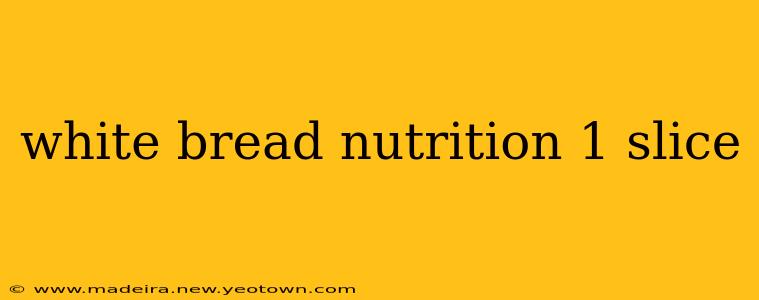Let's be honest, white bread. It's a staple in many households, a convenient go-to for sandwiches, toast, and even croutons. But how much do we really know about what's in that seemingly innocent slice? This isn't about demonizing white bread; it's about understanding its nutritional profile so you can make informed choices about your diet. We'll explore the nutritional content of a single slice, delve into common questions, and look at ways to incorporate it into a healthy eating plan.
What are the Nutritional Facts of One Slice of White Bread?
This is tricky because nutritional information varies widely depending on the brand and specific type of white bread. A standard slice (around 1 ounce) typically contains the following, although these are approximate values:
- Calories: 70-80
- Carbohydrates: 13-15 grams
- Protein: 2-3 grams
- Fat: 1 gram or less
- Fiber: 1 gram or less
- Sugar: 1-2 grams
- Sodium: 100-200 milligrams (this varies significantly)
Keep in mind that enriched white bread often has added folic acid, iron, and some B vitamins, which are nutrients often lost during the refining process. Always check the specific Nutrition Facts label on your bread packaging for the most accurate information.
What are the Benefits of Eating White Bread?
While often unfairly maligned, white bread does offer some benefits:
- Convenience: It’s readily available, inexpensive, and versatile.
- Energy source: Carbohydrates provide energy for the body.
- Fortified nutrients: Enriched varieties often contain added vitamins and minerals.
- Taste and texture: Many find its soft texture and mild flavor appealing.
Is White Bread Bad for You?
The answer isn't a simple yes or no. The problem often lies not with the bread itself, but with how and how much it’s consumed. A slice of white bread as part of a balanced meal isn't inherently unhealthy. However, regularly consuming large quantities of refined carbohydrates, like those found in white bread, can contribute to:
- Weight gain: White bread is relatively low in fiber and high in refined carbohydrates, which can lead to blood sugar spikes and increased hunger.
- Increased risk of type 2 diabetes: The rapid rise in blood sugar from refined carbohydrates can strain the body's insulin regulation.
- Digestive issues: The low fiber content can contribute to constipation.
What's the Difference Between White Bread and Whole Wheat Bread?
The key difference lies in the type of flour used. White bread is made from refined flour, meaning the bran and germ layers of the wheat kernel have been removed. This process removes much of the fiber, vitamins, and minerals. Whole wheat bread, on the other hand, uses the entire wheat kernel, resulting in significantly higher fiber, protein, and nutrient content.
How Much White Bread Should I Eat Per Day?
There's no single answer that fits everyone. It depends on your overall diet, activity level, and individual health goals. Moderation is key. Limiting your intake to a few slices per day, as part of a balanced meal, is a reasonable approach for most people. Consider incorporating more whole grain options into your diet to increase your fiber intake and overall nutritional benefits.
Can I Eat White Bread on a Diet?
Yes, you can, but it's essential to be mindful. Choose lower-sodium options and watch your portion sizes. White bread can fit into a balanced diet, but it shouldn't be the cornerstone of your weight-loss plan. Focus on a diet rich in fruits, vegetables, lean protein, and whole grains for sustained energy and weight management.
Is White Bread Gluten-Free?
No, regular white bread contains gluten, a protein found in wheat. People with celiac disease or gluten sensitivity should avoid white bread and opt for gluten-free alternatives. Many gluten-free bread options are available, but they often differ in taste, texture, and nutritional content compared to traditional white bread.
This exploration of white bread nutrition helps paint a clearer picture. The key takeaway is that it's not inherently "bad," but mindful consumption within a balanced diet is crucial. Make informed choices, read those nutrition labels, and listen to your body.

